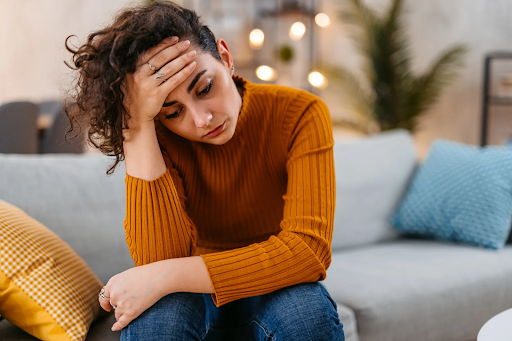Experiencing stomach pain after sex can be alarming, but it's a concern many people share. While it's often harmless, understanding the potential causes—ranging from physical exertion to underlying medical conditions—can help you respond appropriately and ease any anxiety. This article explores the most common reasons for post-sex stomach discomfort, including both physical and emotional factors, and offers practical guidance for relief and prevention.
 Common Causes of Stomach Pain After Sex
Common Causes of Stomach Pain After Sex
1. Physical Exertion
Sexual activity involves various muscle groups and movements, much like exercise. Overexertion or certain positions can strain abdominal or pelvic muscles, leading to soreness or cramping. This discomfort is usually short-lived and improves with rest.
Tip: If you're prone to post-intercourse cramping, consider stretching beforehand or taking breaks. Engaging in low-impact positions and focusing on body awareness can enhance comfort.
2. Gastrointestinal Issues
If you have a sensitive stomach or a condition like IBS, gastritis, or food intolerances, sex may aggravate symptoms. The pressure and movement can stimulate the digestive system, triggering bloating or cramps.
What helps: Avoid heavy meals or gas-inducing foods (like beans or carbonated drinks) before intimacy. Stay hydrated and be mindful of gut-friendly habits.
3. Orgasm-Induced Contractions
During orgasm, involuntary contractions in the pelvic region can sometimes radiate as cramping or pain in the lower abdomen. This is usually normal, but if the pain is intense or lingers, it's worth investigating.
Note: If physical pain is accompanied by emotional distress or feelings of sadness post-sex, you may be experiencing postcoital dysphoria, which deserves attention from a mental health or medical professional.
Less Common Causes of Stomach Pain After Sex
1. Pelvic Inflammatory Disease (PID)
PID is an infection of the female reproductive organs, often stemming from untreated STIs. It can cause post-sex abdominal pain, fever, and abnormal discharge.
If you suspect PID, don’t delay. Doctronic.ai can help you assess symptoms privately and connect with medical professionals for advice or referrals.
2. Endometriosis
A chronic condition where tissue similar to the uterine lining grows outside the uterus, endometriosis causes deep pelvic pain, especially during or after sex.
Symptoms include: painful periods, gastrointestinal issues, fatigue, and discomfort that may persist long after sex.
3. Ovarian Cysts
These fluid-filled sacs on the ovaries can become irritated or ruptured during sex, resulting in sharp, localized pain, often on one side of the lower abdomen.
Regular gynecological check-ups are key to identifying and managing cysts before they become problematic.
Psychological Factors Contributing to Stomach Pain
1. Anxiety and Stress
Psychological factors can also play a significant role in physical sensations, including stomach pain. Anxiety related to sexual performance, relationship dynamics, or past experiences can lead to tension in the body, manifesting as abdominal discomfort. This is often referred to as psychosomatic pain.
Addressing underlying anxiety through counseling or relaxation techniques may help alleviate both the psychological and physical symptoms associated with sexual activity. Mindfulness practices, such as meditation or yoga, can be particularly effective in reducing anxiety levels. These techniques encourage individuals to focus on the present moment, allowing them to release pent-up tension and foster a sense of calm. Additionally, cognitive-behavioral therapy (CBT) can provide valuable tools for reframing negative thought patterns that contribute to anxiety, further helping to ease both mental and physical distress.
 2. Fear of Pregnancy or STIs
2. Fear of Pregnancy or STIs
For some individuals, the fear of unintended pregnancy or sexually transmitted infections can create significant anxiety during and after sex. This anxiety can lead to physical tension and discomfort, including stomach pain. Open communication with partners about contraception and sexual health can help alleviate these fears and reduce associated physical symptoms.
Moreover, educating oneself about sexual health can empower individuals to make informed decisions, thereby reducing anxiety. Understanding the effectiveness of various contraceptive methods and the importance of regular STI screenings can help alleviate fears surrounding sexual encounters. Engaging in discussions with healthcare providers can also provide reassurance and clarity, allowing individuals to approach sexual activity with a more relaxed mindset. This proactive approach not only enhances sexual well-being but also promotes a healthier relationship with one’s body and sexual experiences.
When to Seek Medical Attention
While occasional stomach pain after sex may not be a cause for concern, there are instances when medical attention is warranted. It is essential to be aware of the following signs:
Severe or persistent abdominal pain
Fever or chills
Unusual vaginal bleeding or discharge
Pain during urination or bowel movements
Changes in menstrual cycle
If any of these symptoms occur, it is crucial to consult a healthcare professional for a thorough evaluation. Early intervention can lead to better outcomes and peace of mind.
Understanding the underlying causes of post-coital abdominal pain can also be beneficial. Conditions such as endometriosis, pelvic inflammatory disease, or ovarian cysts can manifest as discomfort during or after sexual activity.
These could indicate infections, reproductive issues, or digestive conditions requiring medical treatment. You can get a preliminary assessment online with Doctronic.ai before deciding on in-person care.
Preventative Measures and Tips
1. Communication with Partners
Open communication with sexual partners can significantly enhance comfort and reduce anxiety. Discussing preferences, boundaries, and any concerns can create a more relaxed environment, potentially minimizing physical discomfort.
Additionally, sharing any past experiences or health issues can foster understanding and support between partners, leading to a more enjoyable sexual experience. It’s important to establish a safe space where both partners feel comfortable expressing their needs and desires. This can include discussing what feels pleasurable, what might cause discomfort, and any specific techniques that can enhance intimacy. Regular check-ins during intimate moments can also help ensure that both partners are on the same page, allowing for adjustments that cater to each individual's comfort level.
2. Experimenting with Positions
Different sexual positions can exert varying levels of pressure on the abdomen. Experimenting with positions that are more comfortable may help alleviate discomfort. Positions that allow for deeper penetration or those that reduce tension in the pelvic area may be beneficial.
Listening to one's body and adjusting accordingly can enhance the overall experience and reduce the likelihood of pain. For instance, side-lying positions can provide a sense of intimacy while also allowing for a gentler approach. Additionally, using pillows for support can help alleviate pressure points and create a more enjoyable experience. Couples might also consider incorporating props or adjusting the angle of penetration to find what feels best for both partners. Exploring new positions together can not only enhance physical comfort but also strengthen emotional bonds through shared discovery.
3. Mindfulness and Relaxation Techniques
Incorporating mindfulness and relaxation techniques into one’s routine can help manage anxiety and stress related to sexual activity. Practices such as deep breathing, meditation, or yoga can promote relaxation and reduce tension in the body.
Taking time to unwind before engaging in sexual activity may also enhance the experience and minimize discomfort. Engaging in a warm bath or a soothing massage can create a tranquil atmosphere, allowing both partners to connect on a deeper level. Moreover, focusing on the sensations of touch and the emotional connection during intimacy can help shift attention away from any anxiety. Couples might also explore guided meditations specifically designed for enhancing intimacy, which can provide tools to foster a deeper connection and a more fulfilling sexual experience. By prioritizing relaxation and presence, partners can cultivate an environment that encourages exploration and enjoyment.
Turning Discomfort into Insight
Post-sex stomach pain can feel confusing, even distressing—but in many cases, it's your body’s way of signaling tension, exertion, or a minor imbalance. Being in tune with these messages is a step toward healthier, more enjoyable intimacy.
By staying curious, communicating openly, and using trusted tools like Doctronic.ai for discreet guidance, you can address your concerns confidently and take control of your sexual and reproductive health.



 Common Causes of Stomach Pain After Sex
Common Causes of Stomach Pain After Sex 2. Fear of Pregnancy or STIs
2. Fear of Pregnancy or STIs